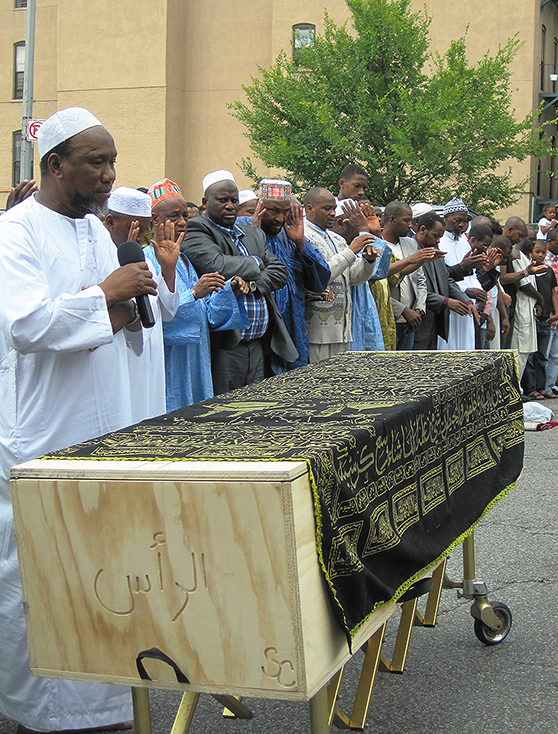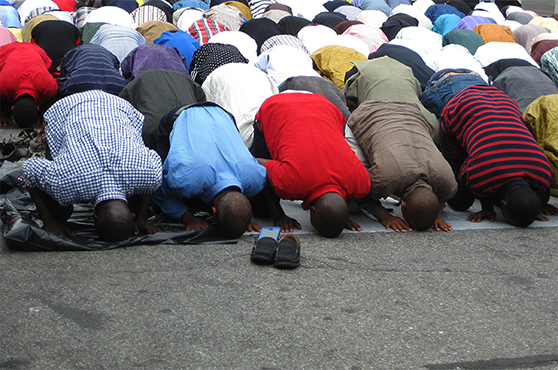
The local imam at the Futa Islamic Center Mosque presided over the funeral held for slain cabbie Aboubacar Bah, 62, last Friday. (JENNIFER LUNA / The Bronx Ink)
The recent killings of two livery cab drivers in Hunts Point and Co-op city has once again raised questions around the need for surveillance cameras inside cabs and how effective they are in preventing violent crimes committed against their drivers.
The cameras inside the livery cabs of Aboubacar Bah and Maodo Kane were not working on the mornings when they were robbed and killed. Authorities said they could have caught the suspects much sooner if the equipment in the cars were functional.
The president of the African Cab Driver’s Association, Mamadou Kane, appealed to police and his fellow drivers to work on solutions. “My message to the community and my fellow cab drivers is to stop the violence,” he said, speaking at the Futa Islamic Center Mosque on 3rd Avenue in the Bronx last Friday, where a short funeral service was held for Aboubacar Bah. “As for my cab drivers, keep your car in good shape.” Kane, not related to the slain Maodo Kane, urged drivers to ensure their cameras and radios are working at all times.
Bronx-based cabbie Mamadou Bah said he believes the camera deters foul play. “These dangerous people are going to see the camera and not get inside,” he said.
Another livery cab driver, however, was not convinced that a working camera in the cab would ensure his safety. “The camera is not the best thing when you’re dead,” said Abrahim Barrie, a friend of the slain Aboubacar Bah.
Barrie’s sentiments were echoed by 42-year-old Alpha Bah who claimed he had been previously assaulted by violent passengers, though never held at gunpoint.
“I think the cab driver is supposed to watch who they are picking up,” said Bah. “The city needs to do a lot of patrolling.”

Many drivers who personally knew Bah and Kane attended the service. Most of them continue to fear for their own safety in light of the killings. (JENNIFER LUNA / The Bronx Ink)
A study released in the Crime Science Journal last year found that installing cameras in cabs is highly effective in reducing homicide rates.. Before cameras were installed, the study found there were a total of 19 homicides of cab drivers in six major U.S. cities. That number dropped to seven after cameras were installed. The study did not disclose names of the cities that were used to carry out tests to confirm the findings.
A spokesman for the New York State Federation of Taxi Drivers, Fernando Mateo, also urged livery cab drivers to avoid picking up illegal street hails. “They’re called illegal because they put your life in danger,” Mateo said.
Livery cabs are for-hire vehicles that are dispatched from individual companies, and are not allowed to stop for people on the street, though these rules are not strictly enforced outside Manhattan. Since a rash of driver killings in the mid-90s, the city has required that every car be equipped with either a bullet-proof divider behind the driver or a surveillance camera, plus other alert signals.
Authorities have made four arrests in connection to the two murders. Bronx residents Takiem Ewing, 21, Tyrone Felder, 25, and Kareem Martin, 26, were charged with second degree murder while Tommy Smalls, 26, apprehended last, is awaiting arraignment.
Police contend that last Tuesday, the men entered Bah’s cab and shot him in the head and used his vehicle to commit robberies in the Bronx and Yonkers. A week earlier, 49-year-old Maodo Kane from Senegal, was killed in Co-op city. Authorities allege the suspects were also involved in Kane’s murder.
The 62-year-old Bah hailed from Guinea and had been driving cabs in New York for 22 years. According to his niece Djnebou Diallo, 27, Bah was married and had five children. His family still lives in a small village in Guinea and his youngest child had just finished college.
Diallo contended that despite the recent killings and the fear that still lingers over the community, most cab drivers will continue to drive their taxis.
“There’s nothing they can do. That’s where their income comes from. It’s hard to find another job,” she said.
